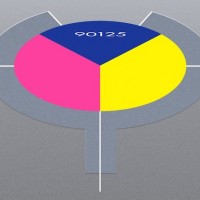It had only been three years between albums for Yes, but it might as well have been 10. 90125, their 11th studio album, signaled a dramatic shift in direction for the world’s greatest progressive rock band.
Gone after 1980’s Drama were vocalist Trevor Horn (to a very successful career as a producer), as well as stalwart guitarist Steve Howe and keyboardist Geoff Downes (who both co-founded the supergroup Asia). While founder Chris Squire and longtime drummer Alan White continued to play together, they suddenly found themselves without a band. Still, the duo forged on with a brief musical flirtation with the rudderless Led Zeppelin guitarist Jimmy Page.
When that effort fizzled, Los Angeles-based, South African-born Trevor Rabin entered the picture. Rabin was impressed with the Yes rhythm section after several jams held in London, and the duo was impressed with Rabin’s style enough and Rabin’s demos, so they moved ahead with forming a band.
In quick succession, they recruited original Yes keyboardist Tony Kaye – whose style complimented Rabin’s ’80s-era stadium rock playing – and Trevor Horn as producer, though the latter initially had reservations about this new band. Initially dubbed Cinema, they began forging new music primarily based on Rabin’s demos. To make a long Yes drama short, Kaye quit the band due to friction with Horn over Kaye’s reluctance to use modern synths, and Jon Anderson joined the group after Chris Squire played him the new music. (Their record company also wanted to have a more distinctive lead vocalist than Rabin or Squire.) The band was rechristened Yes when the Cinema name created some legal issues, and Eddie Jobson (formerly of U.K. and Roxy Music) was briefly brought in on keys – then subsequently replaced by a returning Tony Kaye, further cementing the connection with Yes’ past.
The leadoff single and opening track “Owner of a lonely Heart” has little in common with anything on 1971’s The Yes Album – the most recent Yes project to feature Squire, Anderson and Kaye. Indeed, it’s hard to recognize the band when compared to that which existed even on Drama. Clearly, Trevor Rabin brought a stadium swagger to the band which was more used to Steve Howe’s nuanced playing.
Trevor Horn’s production makes the song jump out of the speakers and provides a modern, reverbed drum track by Alan White. Chris Squire’s bass is clear and present as it swoops and dives through its sonic range, but his instrument is more tightly bound to Alan White than on any of their prior outings. Anderson too is upfront in the mix and sounding more vital than he did on his last Yes outing, 1978’s Tormato. Rabin’s screaming and distorted Fender Stratocaster solo is epic, yet very unlike a Steve Howe solo.
The basic melody of “Owner of a Lonely Heart” was constructed by Rabin, but Squire and Trevor Horn contributed significantly to the lyrics, with a few last minute additions from Jon Anderson. On Trevor Rabin’s solo album, 90124, the demo of “Owner of a Lonely Heart” shows truly how much the band contributed to the song’s dynamics and lyrics.
What of Tony Kaye? His contributions to the song are minimal, if they exist at all. The synthesizer patches were played by Trevor Rabin, and are a nice pad to the melody. The sampled horn stabs of the James Brown horn section were actually played by Alan White on a Fairlight CMI. Its addition moves the song to an entirely new level in the Yes canon.
“Owner of a Lonely Heart” wasn’t great progressive rock, but it is a great rock song. Without this track, it’s doubtful the band Yes would still be here today.
- Thelonious Monk – ‘Thelonious Himself’ (1957; 2025 vinyl reissue) - May 26, 2025
- Ben Tweedt – ‘Life Cycle’ (2025) - May 25, 2025
- Fernando Perdomo – ‘Waves 5’ (2025) - May 13, 2025


